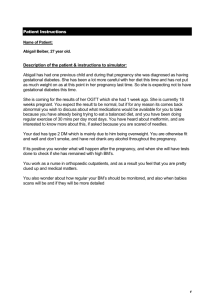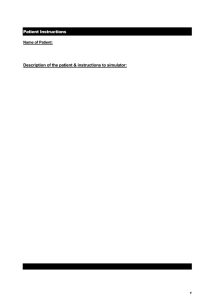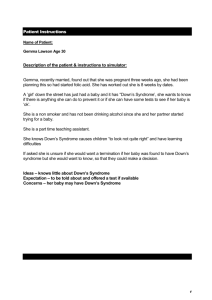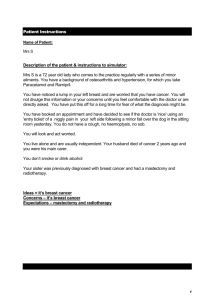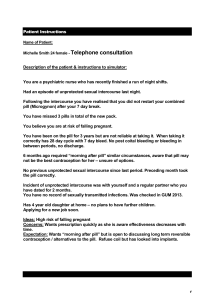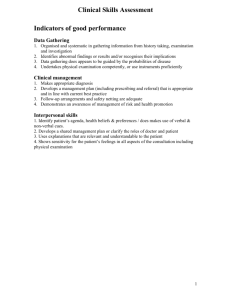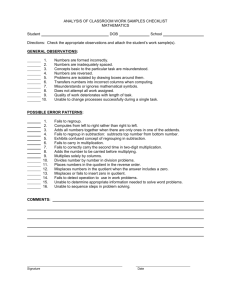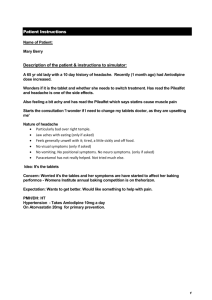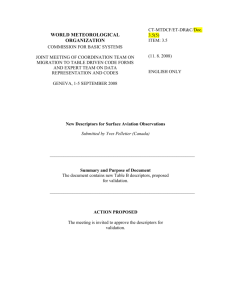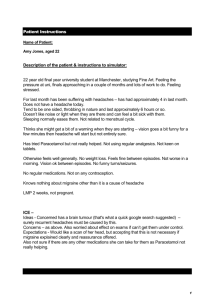Eating disorder - Pennine GP Training
advertisement
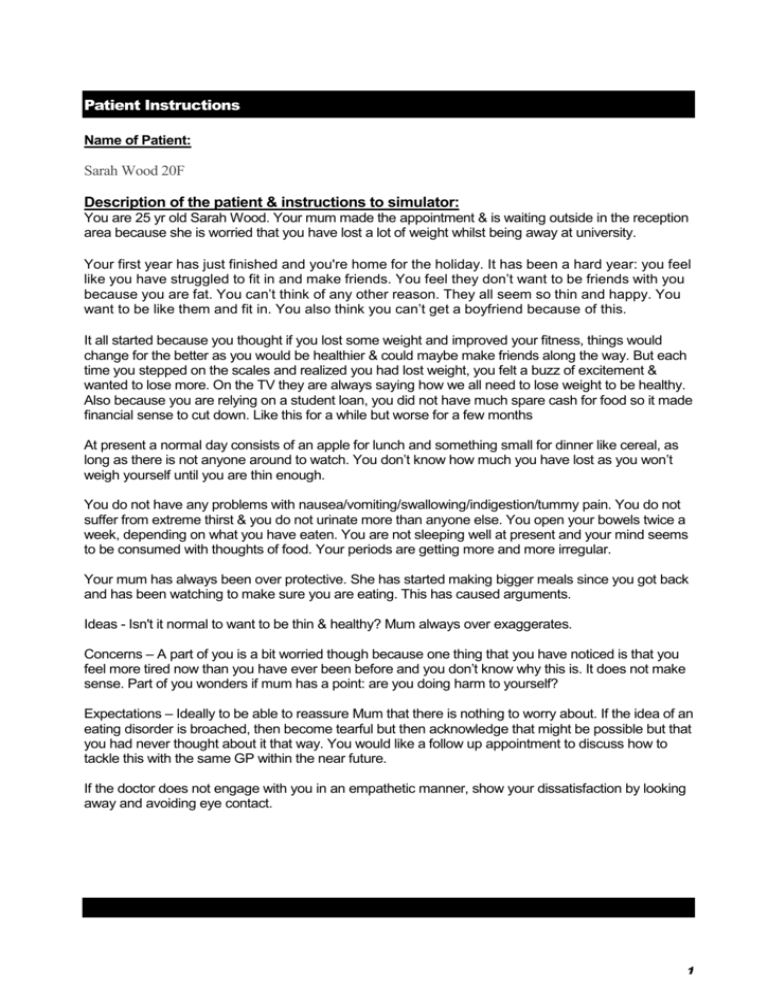
Patient Instructions Name of Patient: Sarah Wood 20F Description of the patient & instructions to simulator: You are 25 yr old Sarah Wood. Your mum made the appointment & is waiting outside in the reception area because she is worried that you have lost a lot of weight whilst being away at university. Your first year has just finished and you're home for the holiday. It has been a hard year: you feel like you have struggled to fit in and make friends. You feel they don’t want to be friends with you because you are fat. You can’t think of any other reason. They all seem so thin and happy. You want to be like them and fit in. You also think you can’t get a boyfriend because of this. It all started because you thought if you lost some weight and improved your fitness, things would change for the better as you would be healthier & could maybe make friends along the way. But each time you stepped on the scales and realized you had lost weight, you felt a buzz of excitement & wanted to lose more. On the TV they are always saying how we all need to lose weight to be healthy. Also because you are relying on a student loan, you did not have much spare cash for food so it made financial sense to cut down. Like this for a while but worse for a few months At present a normal day consists of an apple for lunch and something small for dinner like cereal, as long as there is not anyone around to watch. You don’t know how much you have lost as you won’t weigh yourself until you are thin enough. You do not have any problems with nausea/vomiting/swallowing/indigestion/tummy pain. You do not suffer from extreme thirst & you do not urinate more than anyone else. You open your bowels twice a week, depending on what you have eaten. You are not sleeping well at present and your mind seems to be consumed with thoughts of food. Your periods are getting more and more irregular. Your mum has always been over protective. She has started making bigger meals since you got back and has been watching to make sure you are eating. This has caused arguments. Ideas - Isn't it normal to want to be thin & healthy? Mum always over exaggerates. Concerns – A part of you is a bit worried though because one thing that you have noticed is that you feel more tired now than you have ever been before and you don’t know why this is. It does not make sense. Part of you wonders if mum has a point: are you doing harm to yourself? Expectations – Ideally to be able to reassure Mum that there is nothing to worry about. If the idea of an eating disorder is broached, then become tearful but then acknowledge that might be possible but that you had never thought about it that way. You would like a follow up appointment to discuss how to tackle this with the same GP within the near future. If the doctor does not engage with you in an empathetic manner, show your dissatisfaction by looking away and avoiding eye contact. 1 Doctor’s (GP ST) Instructions Name & age of patient Sarah Wood, age 25 Summary Card This 25 year old medical student comes to you after her mother has arranged an appointment for her. She is attending alone. PMHx; IBS, Anxiety, Headaches Meds; Microgynon 30 8 months ago; Pre-university vaccinations 12 months ago; Pill check. BP 105/65, BMI 20, Never smoked 18 months; IBS. Normal full blood count and U&E's. Started on mebeverine 2 CSA EXAMINATION CARD Patient Name: Examination findings: Exam findings Appears pale and thin BMI 17 Abdomen soft, non-tender BP 110/65 Pulse 52bpm regular If asked - BM 3.8 3 CSA Case Marking Sheet Case Name: Sarah Wood Case Title: Eating disorder Context of case Ability to manage primary care contact with a patient with eating disorder Developing and maintaining a relationship and a style of communication that makes the patient feel comfortable and is not patronising. Acquiring knowledge of the patient’s relevant context, including family, social and psychological factors. Assessment Domain: 1. Data-gathering, technical and assessment skills Positive descriptors: Negative descriptors: Clarifies the problem and nature of the decision required. Makes immediate assumptions about the problem. Identifies physical, social and psychological problems associated with an eating disorder. Intervenes rather using expectant management Is disorganised/unsystematic in gathering information Takes appropriate dietary history Takes social history and assesses social support Does not discover patient’s reasons for attendance Does not assess mental state Does not take dietary history Fails to appreciate physical conquences of anorexia Fails to explore social situation Screens for depression appropriate Assesses risk of co-existing physical or psychological problems. Assessment Domain: 2. Clinical Management Skills Positive descriptors: Negative descriptors: feasible Decisions on management plans are inappropriate and doctor led Considers appropriate investigations ues fbc tft Management approach not based on appropriate risk assessment Demonstrates understanding of the nature of the disease and its prognosis Follow up arrangement are absent or disjointed Simultaneously manages physical and psychological implications of condition Fall to take account of related issues Encourages the patient to inform/seek help from family/peers/university Unable to enhance patient’s health perceptions and coping strategies. Comes to a patient led agreed action plan Fu /referral discussed Offers appropriate management options and 4 GENERIC INDICATORS FOR TARGETED ASSESSMENT DOMAINS – Crib Sheet Assessment Domain: 3. Interpersonal skills Positive descriptors: Negative descriptors: Explores patient’s agenda health beliefs and preferences Does not enquire sufficiently about the patients perspective/ understanding Appears alert to verbal and non verbal clues Pays insufficient attention to the patients verbal and non verbal communication Elicits psychological and social information to place the patients problem in context Fails to explore how the patients life is affected by the problem Works in partnership finding common ground to develop a shared management plan. Does not appreciate the impact of the patients psychosocial context Shows responsiveness to the patients preferences feelings and expectations Instructs the patient rather than seek common ground Uses a rigid approach to consulting that fails to be sufficiently responsive to the patients contribution Enhances patient autonomy Has a positive attitude when dealing with problems Shows commitment to equality of care for all Fails to empower the patient toencourage self sufficiency Show little visible interest/ understanding. Lacks warmth in voice/ manner. Acts in an open non-judgemental manner GLOBAL COMMENTS Positive descriptors Negative descriptors Performs in an organises/ consistent manner Fails to perform consistent manner Recognises the challenges to a sufficient degree Does not recognise the challenge to a sufficient degree Patient centred approach and good time management Shows disproportionate or inappropriate doctor centredness Fails to demonstrate management in an organised/ good time Other aspects e.g. time keeping, consultation structure, comment on consultation skills etc Positive descriptors: Negative descriptors: Grading: Clear pass = 3, Marginal Pass = 2, Marginal Fail = 1, Clear Fail = 0 Data Gathering Score = Clinical Management Score = Interpersonal Skills Score = Total for case = (max = 9) 5 1. DATA-GATHERING, TECHNICAL & ASSESSMENT SKILLS: Gathering & using data for clinical judgement, choice of examination, investigations & their interpretation. Demonstrating proficiency in performing physical examinations & using diagnostic and therapeutic instruments (Blueprint: Problem-solving skills, Technical Skills) Positive Indicators Negative Indicators Clarifies the problem & nature of decision required Uses an incremental approach, using time and accepting uncertainty Gathers information from history taking, examination and investigation in a systematic and efficient manner. Is appropriately selective in the choice of enquiries, examinations & investigations Makes immediate assumptions about the problem Intervenes rather than using appropriate expectant management Is disorganised/unsystematic in gathering information Data gathering does not appear to be guided by the probabilities of disease. Fails to identify abnormal data or correctly interpret them Identifies abnormal findings or results & makes appropriate interpretations Uses instruments appropriately & fluently When using instruments or conducting physical examinations, performs actions in a rational sequence Appears unsure of how to operate/use instruments Appears disorganised/unsystematic in the application of the instruments or the conduct of physical examinations 2. CLINICAL MANAGEMENT SKILLS: Recognition & management of common medical conditions in primary care. Demonstrating a structured & flexible approach to decision-making. Demonstrating the ability to deal with multiple complaints and co-morbidity. Demonstrating the ability to promote a positive approach to health (Blueprint: Primary Care Management, Comprehensive approach) Positive Indicators Negative Indicators 3. Recognises presentations of common physical, psychological & social problems. Makes plans that reflect the natural history of common problems Offers appropriate and feasible management options Management approaches reflect an appropriate assessment of risk Makes appropriate prescribing decisions Refers appropriately & co-ordinates care with other healthcare professionals Fails to consider common conditions in the differential diagnosis Does not suggest how the problem might develop or resolve Fails to make the patient aware of relative risks of different approaches Decisions on whether/what to prescribe are inappropriate or idiosyncratic. Decisions on whether & where to refer are inappropriate. Follow-up arrangements are absent or disjointed Manages risk effectively, safety netting appropriately Simultaneously manages multiple health problems, both acute & chronic Encourages improvement, rehabilitation, and, where appropriate, recovery. Encourages the patient to participate in appropriate health promotion and disease prevention strategies Fails to take account of related issues or of co-morbidity Unable to construct a problem list and prioritise Unable to enhance patient’s health perceptions and coping strategies INTERPERSONAL SKILLS Demonstrating the use of recognised communication techniques to gain understanding of the patient's illness experience and develop a shared approach to managing problems. Practising ethically with respect for equality & diversity issues, in line with the accepted codes of professional conduct. (Blueprint: Person-Centred Approach, Attitudinal Aspects) 6 Positive Indicators Negative Indicators Explores patient’s agenda, health beliefs & preferences. Appears alert to verbal and non-verbal cues. Explores the impact of the illness on the patient's life Elicits psychological & social information to place the patient’s problem in context Works in partnership, finding common ground to develop a shared management plan Communicates risk effectively to patients Shows responsiveness to the patient's preferences, feelings and expectations Enhances patient autonomy Does not inquire sufficiently about the patient’s perspective / health understanding. Pays insufficient attention to the patient's verbal and nonverbal communication. Fails to explore how the patient's life is affected by the problem. Does not appreciate the impact of the patient's psychosocial context Instructs the patient rather than seeking common ground Uses a rigid approach to consulting that fails to be sufficiently responsive to the patient's contribution Fails to empower the patient or encourage self-sufficiency Uses inappropriate (e.g. technical) language Provides explanations that are relevant and understandable to the patient Responds to needs & concerns with interest & understanding Has a positive attitude when dealing with problems, admits mistakes & shows commitment to improvement. Backs own judgment appropriately Demonstrates respect for others Does not allow own views/values to inappropriately influence dialogue Shows commitment to equality of care for all Acts in an open, non-judgmental manner Is cooperative & inclusive in approach Conducts examinations with sensitivity for the patient's feelings, seeking consent where appropriate Shows little visible interest/understanding, lacks warmth in voice/manner Avoids taking responsibility for errors Does not show sufficient respect for others. Inappropriately influences patient interaction through own views/values Treats issues as problems rather than challenges Displays inappropriate favour or prejudice Is quick to judge Appears patronising or inappropriately paternalistic When conducting examinations, appears unprofessional and at risk of hurting or embarrassing the patient CSA Grade descriptors Key: Clear Pass -- Marginal Pass -- Marginal Fail -- Clear Fail CP The candidate demonstrates an above-average level of competence, with a justifiable clinical approach that is fluent, appropriately focussed and technically proficient. The candidate shows sensitivity, actively shares ideas and may empower the patient MP The candidate demonstrates an adequate level of competence, displaying a clinical may not be fluent but is justifiable and technically proficient. approach that The candidate shows sensitivity and tries to involve the patient. MF The candidate fails to demonstrate adequate competence, with a clinical approach that is at times unsystematic or inconsistent with accepted practice. Technical proficiency may be of concern. The patient is treated with sensitivity and respect but the doctor does not sufficiently respond to the patient’s contribution. facilitate or CF The candidate clearly fails to demonstrate competence, with clinical management that is incompatible with accepted practice or a problem-solving approach that is arbitrary or technically incompetent. The patient is not treated with adequate attention, sensitivity or respect for their contribution. Note: All three CSA domains must be assessed in order to make the final global judgement. The descriptors in italics address interpersonal skills. The rest of the text addresses the other two domains. The standard for “competence” is at the level required for the doctor to be licensed for general practice. 7
